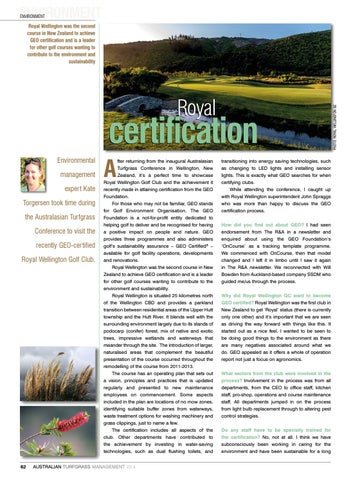ENVIRONMENT ENVIRONMENT
Royal
certification Environmental management expert Kate Torgersen took time during the Australasian Turfgrass Conference to visit the recently GEO-certified Royal Wellington Golf Club.
62
A
fter returning from the inaugural Australasian Turfgrass Conference in Wellington, New Zealand, it’s a perfect time to showcase Royal Wellington Golf Club and the achievement it recently made in attaining certification from the GEO Foundation. For those who may not be familiar, GEO stands for Golf Environment Organisation. The GEO Foundation is a not-for-profit entity dedicated to helping golf to deliver and be recognised for having a positive impact on people and nature. GEO provides three programmes and also administers golf’s sustainability assurance – GEO Certified® –
available for golf facility operations, developments and renovations. Royal Wellington was the second course in New Zealand to achieve GEO certification and is a leader for other golf courses wanting to contribute to the environment and sustainability. Royal Wellington is situated 25 kilometres north of the Wellington CBD and provides a parkland transition between residential areas of the Upper Hutt township and the Hutt River. It blends well with the surrounding environment largely due to its stands of podocarp (conifer) forest, mix of native and exotic trees, impressive wetlands and waterways that meander through the site. The introduction of larger, naturalised areas that complement the beautiful presentation of the course occurred throughout the remodelling of the course from 2011-2013. The course has an operating plan that sets out a vision, principles and practices that is updated regularly and presented to new maintenance employees on commencement. Some aspects included in the plan are locations of no mow zones, identifying suitable buffer zones from waterways, waste treatment options for washing machinery and grass clippings, just to name a few. The certification includes all aspects of the club. Other departments have contributed to the achievement by investing in water-saving technologies, such as dual flushing toilets, and
AUSTRALIAN TURFGRASS MANAGEMENT 20.4
transitioning into energy saving technologies, such as changing to LED lights and installing sensor lights. This is exactly what GEO searches for when certifying clubs. While attending the conference, I caught up with Royal Wellington superintendent John Spraggs who was more than happy to discuss the GEO certification process. How did you find out about GEO? I had seen endorsement from The R&A in a newsletter and enquired about using the GEO Foundation’s ‘OnCourse’ as a tracking template programme. We commenced with OnCourse, then that model changed and I left it in limbo until I saw it again in The R&A newsletter. We reconnected with Will Bowden from Auckland-based company SSDM who guided me/us through the process. Why did Royal Wellington GC want to become GEO certified? Royal Wellington was the first club in New Zealand to get ‘Royal’ status (there is currently only one other) and it’s important that we are seen as driving the way forward with things like this. It started out as a nice feel. I wanted to be seen to be doing good things to the environment as there are many negatives associated around what we do. GEO appealed as it offers a whole of operation report not just a focus on agronomics. What sectors from the club were involved in the process? Involvement in the process was from all departments, from the CEO to office staff, kitchen staff, pro-shop, operations and course maintenance staff. All departments jumped in on the process from light bulb replacement through to altering pest control strategies. Do any staff have to be specially trained for the certification? No, not at all. I think we have subconsciously been working in caring for the environment and have been sustainable for a long
PHOTO: ROYAL WELLINGTON GC
Royal Wellington was the second course in New Zealand to achieve GEO certification and is a leader for other golf courses wanting to contribute to the environment and sustainability
